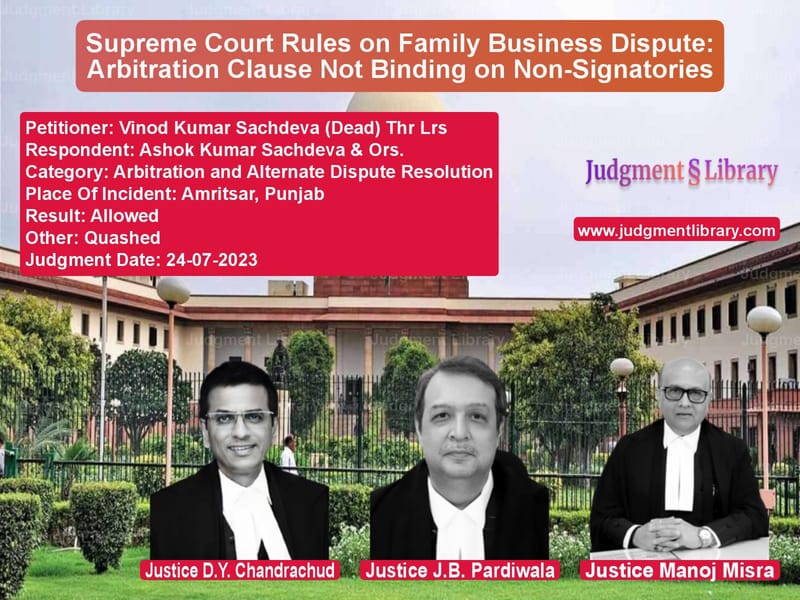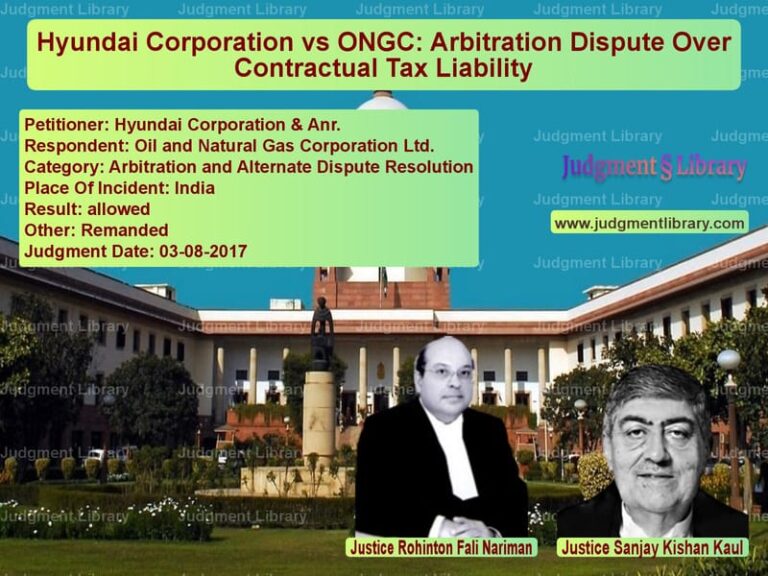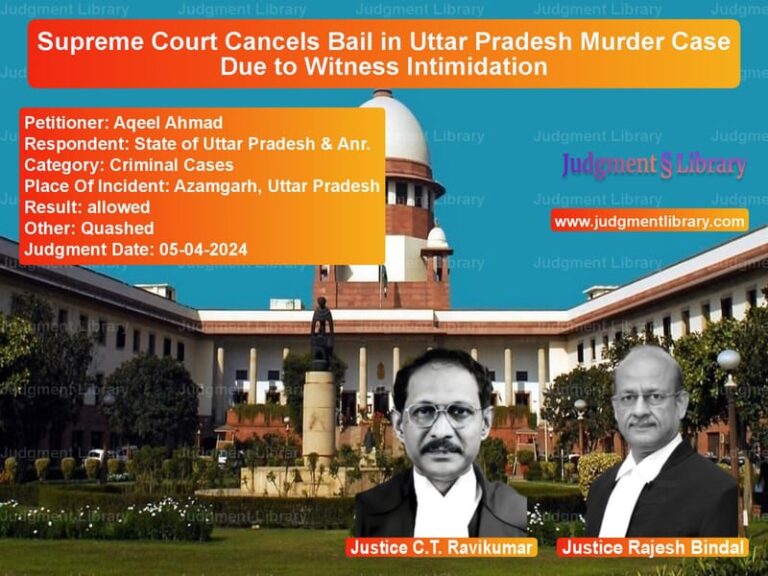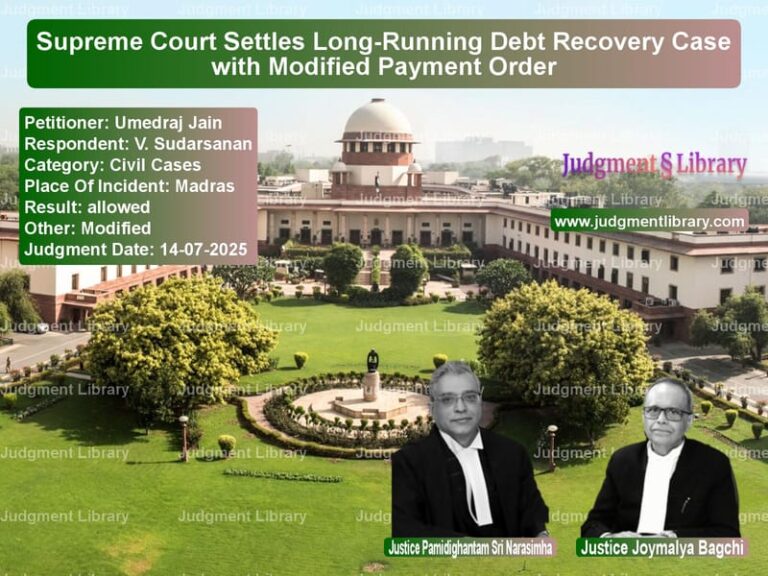Supreme Court Rules on Family Business Dispute: Arbitration Clause Not Binding on Non-Signatories
The legal dispute between Vinod Kumar Sachdeva and Ashok Kumar Sachdeva has brought to light significant issues concerning arbitration agreements, family business conflicts, and judicial intervention. The Supreme Court of India recently ruled on whether a Memorandum of Understanding (MoU) signed between two brothers regarding family business properties could bind other non-signatory entities to arbitration. This case, arising from a long-standing business dispute, is critical for understanding the extent of arbitration clauses in commercial agreements.
Background of the Case
The appellant, Vinod Kumar Sachdeva, and the first respondent, Ashok Kumar Sachdeva, were brothers conducting business under the name Sachdeva and Sons. Their business involved multiple properties, many of which were registered in the names of family members. Over time, disputes arose regarding ownership and control of these properties, leading to a formal Memorandum of Understanding (MoU) on September 14, 2010. The MoU stipulated that the family’s joint properties would be liquidated to settle business liabilities. It also contained an arbitration clause stating that disputes would be referred to arbitrators.
Read also: https://judgmentlibrary.com/supreme-court-rejects-review-petition-in-foreign-arbitration-award-case/
Key Provisions of the MoU’s Arbitration Clause
The arbitration clause in the MoU stated:
“In case of any clarification needed or dispute arising, the same shall be referred for settlement and arbitration to Revered Maa Deva Ji and/or Sh. Surinder Kumar alias Chhindi Ji of Ghaziabad and/or if required, to any other person to be mutually appointed, and the decision of the arbitrator(s) shall be binding on both the parties.”
The dispute escalated when the appellant, Vinod Kumar Sachdeva, filed two civil suits in 2014 and 2015, seeking an injunction to prevent the sale or encumbrance of certain properties. The respondents filed an application under Section 8 of the Arbitration and Conciliation Act, 1996, arguing that the disputes should be resolved through arbitration, as per the MoU.
Proceedings Before the Punjab & Haryana High Court
The Civil Judge (Junior Division), Amritsar, initially rejected the Section 8 application, holding that not all parties to the suit were bound by the arbitration agreement. However, the respondents appealed to the Punjab & Haryana High Court, which overturned the lower court’s decision and directed that the disputes be referred to arbitration.
In response, the appellant challenged the High Court’s ruling before the Supreme Court, arguing that arbitration could not be imposed on non-signatories like Sachdeva and Sons Industries Private Limited and Canara Bank, both of which were involved in the suits.
Key Issues Before the Supreme Court
- Whether an arbitration clause in an MoU between two individuals can be extended to entities that were not signatories.
- Whether the reliefs sought in the civil suits required a judicial determination rather than arbitration.
- Whether the High Court erred in invoking arbitration when multiple parties were involved.
Arguments by the Appellant (Vinod Kumar Sachdeva)
The appellant’s counsel, Rajiv Talwar, argued:
- The arbitration agreement was solely between the appellant and the first respondent. Non-signatories, such as Canara Bank and Sachdeva and Sons Industries Private Limited, could not be bound by the arbitration clause.
- The suits involved issues of property ownership, banking obligations, and third-party rights that required judicial adjudication rather than arbitration.
- By compelling arbitration, the High Court exceeded its jurisdiction by binding non-consenting parties to the process.
Arguments by the Respondent (Ashok Kumar Sachdeva)
The respondents’ counsel, Vishal Mahajan, argued:
- The arbitration clause in the MoU clearly indicated that any dispute related to the family business should be resolved through arbitration.
- The intention of the parties at the time of signing the MoU was to avoid court proceedings and refer all disputes to arbitration.
- The reliefs sought in the civil suits stemmed directly from the MoU, making arbitration the appropriate forum.
Supreme Court’s Observations and Ruling
A three-judge bench comprising Chief Justice D.Y. Chandrachud, J.B. Pardiwala, and Manoj Misra delivered the judgment on July 25, 2023. The Court ruled in favor of the appellant, holding that the High Court had erred in compelling arbitration.
The Court made the following key observations:
- The arbitration clause applied only to the signatories of the MoU, namely, the appellant and the first respondent.
- “Neither Canara Bank nor the company are parties to the arbitration agreement.” The arbitration agreement could not bind third parties who had not consented to it.
- Given that the civil suits sought injunctions on property transactions and banking activities, these matters were beyond the scope of the arbitration clause.
- While arbitration is encouraged, it cannot be enforced at the expense of non-signatory parties’ legal rights.
Final Judgment
The Supreme Court set aside the Punjab & Haryana High Court’s order and restored the trial court’s decision to reject arbitration. The ruling reaffirmed the fundamental principle that arbitration requires mutual consent and cannot be imposed on non-signatories.
The Court stated:
“The reference to arbitration under Section 8 of the trial Judge was patently in error. Neither Canara Bank nor the company are parties to the arbitration agreement. The MoU has been executed between the appellant and the first respondent. The non-family shareholdings, in any event, cannot be bound by the terms of the MoU since they are not parties to the document.”
With this ruling, the case was remanded to the trial court, allowing the appellant to proceed with his suits against all parties.
Implications of the Judgment
This judgment has significant implications for arbitration law and family business disputes:
- Arbitration clauses cannot be extended to non-signatories unless explicitly agreed upon.
- Civil courts retain jurisdiction over disputes involving third-party rights and property.
- Business families must ensure clear legal documentation to avoid disputes over arbitration clauses.
- The ruling reinforces the principle that arbitration cannot override statutory rights.
The Supreme Court’s decision in this case upholds the integrity of contractual agreements while ensuring that non-signatory parties are not unjustly subjected to arbitration.
Petitioner Name: Vinod Kumar Sachdeva (Dead) Thr Lrs.Respondent Name: Ashok Kumar Sachdeva & Ors..Judgment By: Justice D.Y. Chandrachud, Justice J.B. Pardiwala, Justice Manoj Misra.Place Of Incident: Amritsar, Punjab.Judgment Date: 24-07-2023.
Don’t miss out on the full details! Download the complete judgment in PDF format below and gain valuable insights instantly!
Download Judgment: vinod-kumar-sachdeva-vs-ashok-kumar-sachdeva-supreme-court-of-india-judgment-dated-24-07-2023.pdf
Directly Download Judgment: Directly download this Judgment
See all petitions in Arbitration Awards
See all petitions in Dispute Resolution Mechanisms
See all petitions in Enforcement of Awards
See all petitions in Judgment by Dhananjaya Y Chandrachud
See all petitions in Judgment by J.B. Pardiwala
See all petitions in Judgment by Manoj Misra
See all petitions in allowed
See all petitions in Quashed
See all petitions in supreme court of India judgments July 2023
See all petitions in 2023 judgments
See all posts in Arbitration and Alternate Dispute Resolution Category
See all allowed petitions in Arbitration and Alternate Dispute Resolution Category
See all Dismissed petitions in Arbitration and Alternate Dispute Resolution Category
See all partially allowed petitions in Arbitration and Alternate Dispute Resolution Category







